- Home
- Julian Barnes
The Sense of an Ending Page 3
The Sense of an Ending Read online
Page 3
‘Of course, everyone’s wondering what Ted Hughes will do when he runs out of animals.’
‘Are they?’
‘So I’ve been told,’ I said feebly. In Dixon’s mouth, the line had seemed witty and sophisticated; in mine, merely facetious.
‘Poets don’t run out of material the way novelists do,’ she instructed me. ‘Because they don’t depend on material in the same way. And you’re treating him like a sort of zoologist, aren’t you? But even zoologists don’t tire of animals, do they?’
She was looking at me with one eyebrow raised above the frame of her glasses. She was five months older than me and sometimes made it feel like five years.
‘It was just something my English master said.’
‘Well, now you’re at university we must get you to think for yourself, mustn’t we?’
There was something about the ‘we’ that made me suspect I hadn’t got everything wrong. She was just trying to improve me – and who was I to object to that? One of the first things she asked me was why I wore my watch on the inside of my wrist. I couldn’t justify it, so I turned the face round, and put time on the outside, as normal, grown-up people did.
I settled into a contented routine of working, spending my free time with Veronica and, back in my student room, wanking explosively to fantasies of her splayed beneath me or arched above me. Daily intimacy made me proud of knowing about make-up, clothes policy, the feminine razor, and the mystery and consequences of a woman’s periods. I found myself envying this regular reminder of something so wholly female and defining, so connected to the great cycle of nature. I may have put it as badly as this when I tried to explain the feeling.
‘You’re just romanticising what you haven’t got. The only point of it is to tell you you’re not pregnant.’
Given our relationship, this struck me as a bit cheeky.
‘Well, I hope we’re not living in Nazareth.’
There followed one of those pauses when couples tacitly agree not to discuss something. And what was there to discuss? Only, perhaps, the unwritten terms of the trade-off. From my point of view, the fact that we weren’t having sex exonerated me from thinking about the relationship other than as a close complicity with a woman who, as her part of the bargain, wasn’t going to ask the man where the relationship was heading. At least, that’s what I thought the deal was. But I was wrong about most things, then as now. For instance, why did I assume she was a virgin? I never asked her, and she never told me. I assumed she was because she wouldn’t sleep with me: and where is the logic in that?
One weekend in the vacation, I was invited to meet her family. They lived in Kent, out on the Orpington line, in one of those suburbs which had stopped concreting over nature at the very last minute, and ever since smugly claimed rural status. On the train down from Charing Cross, I worried that my suitcase – the only one I owned – was so large it made me look like a potential burglar. At the station, Veronica introduced me to her father, who opened the boot of his car, took the suitcase from my hand, and laughed.
‘Looks like you’re planning to move in, young man.’
He was large, fleshy and red-faced; he struck me as gross. Was that beer on his breath? At this time of day? How could this man have fathered such an elfin daughter?
He drove his Humber Super Snipe with a sighing impatience at the folly of others. I sat in the back, alone. Occasionally, he would point things out, presumably to me, though I couldn’t tell if I was meant to reply. ‘St Michael’s, brick and flint, much improved by Victorian restorers.’ ‘Our very own Café Royal – voilà!’ ‘Note the distinguished off-licence with period half-timbering on your right.’ I looked at Veronica’s profile for a clue, but received none.
They lived in a detached, red-brick, tile-hung house with a strip of gravel in front of it. Mr Ford opened the front door and shouted to no one in particular,
‘The boy’s come for a month.’
I noticed the heavy shine on the dark furniture, and the heavy shine on the leaves of an extravagant pot plant. Veronica’s father seized my case as if responding to the distant laws of hospitality and, farcically exaggerating its weight, carried it up to an attic room and threw it on the bed. He pointed to a small plumbed-in basin.
‘Pee in there in the night if you want to.’
I nodded in reply. I couldn’t tell if he was being all matily male, or treating me as lower-class scum.
Veronica’s brother, Jack, was easier to read: one of those healthy, sporting young men who laughed at most things and teased his younger sister. He behaved towards me as if I were an object of mild curiosity, and by no means the first to be exhibited for his appreciation. Veronica’s mother ignored all the by-play around her, asked me about my studies, and disappeared into the kitchen a lot. I suppose she must have been in her early forties, though of course she appeared to me deep into middle age, as did her husband. She didn’t look much like Veronica: a broader face, hair tied off her high forehead with a ribbon, a bit more than average height. She had a somewhat artistic air, though precisely how this expressed itself – colourful scarves, a distrait manner, the humming of opera arias, or all three – I couldn’t at this distance testify.
I was so ill at ease that I spent the entire weekend constipated: this is my principal factual memory. The rest consists of impressions and half-memories which may therefore be self-serving: for instance, how Veronica, despite having invited me down, seemed at first to withdraw into her family and join in their examination of me – though whether this was the cause, or the consequence, of my insecurity, I can’t from here determine. Over supper that Friday there was some questioning of my social and intellectual credentials; I felt as if I were before a court of inquiry. Afterwards we watched the TV news and awkwardly discussed world affairs until bedtime. Had we been in a novel, there might have been some sneaking between floors for a hot cuddle after the paterfamilias had locked up for the night. But we weren’t; Veronica didn’t even kiss me goodnight that first evening, or make some excuse about towels, and seeing I had everything I needed. Perhaps she feared her brother’s mockery. So I undressed, washed, peed aggressively in the basin, got into my pyjamas and lay awake for a long time.
When I came down for breakfast, only Mrs Ford was around. The others had gone for a walk, Veronica having assured everyone that I would want to sleep in. I can’t have disguised my reaction to this very well, as I could sense Mrs Ford examining me while she made bacon and eggs, frying things in a slapdash way and breaking one of the yolks. I wasn’t experienced at talking to girlfriends’ mothers.
‘Have you lived here long?’ I eventually asked, though I already knew the answer.
She paused, poured herself a cup of tea, broke another egg into the pan, leant back against a dresser stacked with plates, and said,
‘Don’t let Veronica get away with too much.’
I didn’t know how to reply. Should I be offended at this interference in our relationship, or fall into confessional mode and ‘discuss’ Veronica? So I said, a little primly,
‘What do you mean, Mrs Ford?’
She looked at me, smiled in an unpatronising way, shook her head slightly, and said, ‘We’ve lived here ten years.’
So in the end I was almost as much at sea with her as with the rest of them, though at least she appeared to like me. She eased another egg on to my plate, despite my not asking for it or wanting it. The remnants of the broken one were still in the pan; she flipped them casually into the swing-bin, then half-threw the hot frying pan into the wet sink. Water fizzed and steam rose at the impact, and she laughed, as if she had enjoyed causing this small havoc.
When Veronica and the menfolk returned, I was expecting further examination, perhaps even some trick or game; instead there were polite enquiries after my sleep and comfort. This ought to have made me feel accepted, but it seemed more as if they had grown tired of me, and the weekend was now just something to be got through. Perhaps this was mere paranoia. But
on the plus side, Veronica became more openly affectionate; over tea she was happy to put her hand on my arm and fiddle with my hair. At one point, she turned to her brother and said,
‘He’ll do, won’t he?’
Jack winked at me; I didn’t wink back. Instead, part of me felt like stealing some towels, or walking mud into the carpet.
Still, things were mostly almost normal. That evening, Veronica walked me upstairs and kissed me goodnight properly. For Sunday lunch there was a joint of roast lamb with enormous sprigs of rosemary sticking out of it like bits of Christmas tree. Since my parents had taught me manners, I said how delicious it was. Then I caught Jack winking at his father, as if to say: What a creep. But Mr Ford chortled, ‘Hear, hear, motion seconded,’ while Mrs Ford thanked me.
When I came downstairs to say goodbye, Mr Ford seized my suitcase and said to his wife, ‘I trust you’ve counted the spoons, darling?’ She didn’t bother to answer, just smiled at me, almost as if we had a secret. Brother Jack didn’t show up to say farewell; Veronica and her father got into the front of the car; I sat in the back again. Mrs Ford was leaning against the porch, sunlight falling on a wisteria climbing the house above her head. As Mr Ford put the car into gear and spun the wheels on the gravel, I waved goodbye, and she responded, though not the way people normally do, with a raised palm, but with a sort of horizontal gesture at waist level. I rather wished I’d talked to her more.
To stop Mr Ford pointing out the wonders of Chislehurst a second time, I said to Veronica, ‘I like your mum.’
‘Sounds like you’ve got a rival, Vron,’ said Mr Ford, with a theatrical intake of breath. ‘Come to think of it, sounds like I have too. Pistols at dawn, young feller-me-lad?’
My train was late, slowed by the usual Sunday engineering work. I got home in the early evening. I remember that I had a bloody good long shit.
A week or so later, Veronica came up to town so I could introduce her to my gang from school. It proved an aimless day of which no one wanted to take charge. We went round the Tate, then walked up to Buckingham Palace and into Hyde Park, heading for Speakers’ Corner. But there weren’t any speakers in action, so we wandered along Oxford Street looking at the shops, and ended up in Trafalgar Square among the lions. Anyone would have thought we were tourists.
At first I was watching to see how my friends reacted to Veronica, but soon became more interested in what she thought of them. She laughed at Colin’s jokes more easily than at mine, which annoyed me, and asked Alex how his father made his money (marine insurance, he told her, to my surprise). She seemed happy to keep Adrian for last. I’d told her he was at Cambridge, and she tried out various names on him. At a couple of them he nodded and said,
‘Yes, I know the sort of people they are.’
This sounded pretty rude to me, but Veronica didn’t take offence. Instead, she mentioned colleges and dons and tea shops in a way that made me feel left out.
‘How come you know so much about the place?’ I asked.
‘That’s where Jack is.’
‘Jack?’
‘My brother – you remember?’
‘Let me see … Was he the one who was younger than your father?’
I thought that wasn’t bad, but she didn’t even smile.
‘What’s Jack reading?’ I asked, trying to make up ground.
‘Moral sciences,’ she replied. ‘Like Adrian.’
I know what Adrian’s bloody reading, thank you very much, I wanted to say. Instead I sulked for a while, and talked to Colin about films.
Towards the end of the afternoon we took photos; she asked for ‘one with your friends’. The three of them shuffled politely into line, whereupon she rearranged them: Adrian and Colin, the two tallest, on either side of her, with Alex beyond Colin. The resulting print made her look even slighter than she did in the flesh. Many years later, when I came to examine this photo again, looking for answers, I wondered about the fact that she never wore heels of any height. I’d read somewhere that if you want to make people pay attention to what you’re saying, you don’t raise your voice but lower it: this is what really commands attention. Perhaps hers was a similar kind of trick with height. Though whether she went in for tricks is a question I still haven’t resolved. When I was going out with her, it always seemed that her actions were instinctive. But then I was resistant to the whole idea that women were or could be manipulative. This may tell you more about me than it does about her. And even if I were to decide, at this late stage, that she was and always had been calculating, I’m not sure it would help matters. By which I mean: help me.
We walked her to Charing Cross and waved her off to Chislehurst in a mock-heroic way, as if she were travelling to Samarkand. Then we sat in the bar of the station hotel, drinking beer and feeling very grown up.
‘Nice girl,’ said Colin.
‘Very nice,’ added Alex.
‘That’s philosophically self-evident!’ I almost shouted. Well, I was a little overexcited. I turned to Adrian. ‘Any advance on “very nice”?’
‘You don’t actually need me to congratulate you, do you, Anthony?’
‘Yes, why the fuck shouldn’t I?’
‘Then of course I do.’
But his attitude seemed to criticise my neediness and the other two for pandering to it. I felt slightly panicked; I didn’t want the day to unravel. Though looking back, it was not the day, but the four of us, that were beginning to unravel.
‘So, have you come across Brother Jack at Cambridge?’
‘I haven’t met him, no, and don’t expect to. He’s in his final year. But I’ve heard of him, read about him in a magazine article. And about the people he goes around with, yes.’
He clearly wanted to leave it at that, but I wouldn’t let him.
‘And so what do you think of him?’
Adrian paused. He took a sip of beer, and then said with sudden vehemence, ‘I hate the way the English have of not being serious about being serious. I really hate it.’
In another mood, I might have taken this as a strike against the three of us. Instead, I felt a throb of vindication.
Veronica and I continued going out together, all through our second year. One evening, perhaps a little drunk, she let me put my hand down her knickers. I felt extravagant pride as I scuffled around. She wouldn’t let me put my finger inside her, but wordlessly, over the next days, we developed a way to pleasure. We would be on the floor, kissing. I would take off my watch, roll up my left sleeve, put my hand into her knickers and gradually shuffle them down her thighs a little; then I would place my hand flat on the floor, and she would rub herself against my trapped wrist until she came. For a few weeks this made me feel masterful, but back in my room my wanking was sometimes edged with resentment. And what kind of a trade-off had I got myself into now? A better, or a worse one? I discovered something else I couldn’t understand: I was, presumably, meant to feel closer to her, but didn’t.
‘So, do you ever think about where our relationship is heading?’
She said it just like that, out of the blue. She had come round for tea, bringing slices of fruitcake.
‘Do you?’
‘I asked first.’
I thought – and it may not have been a gallant reaction – is this why you started letting me put my hand down your pants?
‘Does it have to head somewhere?’
‘Isn’t that what relationships do?’
‘I don’t know. I haven’t been in enough of them.’
‘Look, Tony,’ she said. ‘I don’t stagnate.’
I thought about this for a while, or tried to. But instead kept seeing an image of stagnant water, with thick scum and hovering mosquitoes. I realised I wasn’t much good at discussing this sort of stuff.
‘So you think we’re stagnating?’
She did that eyebrow-above-the-spectacle-frame tic that I no longer found quite so cute. I went on,
‘Isn’t there something between stagnation and heading som
ewhere?’
‘Like?’
‘Like having a nice time. Enjoy the day and all that?’ But just saying this made me wonder if I was enjoying the day any longer. I also thought: What does she want me to say?
‘And do you think we’re suited?’
‘You keep asking me questions as if you know the answer to them. Or as if you know the answer you want. So why don’t you tell me what it is and I’ll tell you whether it’s mine as well?’
‘You’re quite cowardly, aren’t you, Tony?’
‘I think it’s more that I’m … peaceable.’
‘Well, I wouldn’t want to disturb your self-image.’
We finished our tea. I wrapped up the two remaining slices of cake and put them in a tin. Veronica kissed me nearer the corner of my lips than the centre, and then left. In my mind, this was the beginning of the end of our relationship. Or have I just remembered it this way to make it seem so, and to apportion blame? If asked in a court of law what happened and what was said, I could only attest to the words ‘heading’, ‘stagnating’ and ‘peaceable’. I’d never thought of myself as peaceable – or its opposite – until then. I would also swear to the truth of the biscuit tin; it was burgundy red, with the Queen’s smiling profile on it.
I don’t want to give the impression that all I did at Bristol was work and see Veronica. But few other memories come back to me. One that does – one single, distinct event – was the night I witnessed the Severn Bore. The local paper used to print a timetable, indicating where best to catch it and when. But the first occasion I tried, the water didn’t seem to be obeying its instructions. Then, one evening at Minsterworth, a group of us waited on the river bank until after midnight and were eventually rewarded. For an hour or two we observed the river flowing gently down to the sea as all good rivers do. The moon’s intermittent lighting was assisted by the occasional explorations of a few powerful torches. Then there was a whisper, and a craning of necks, and all thoughts of damp and cold vanished as the river simply seemed to change its mind, and a wave, two or three feet high, was heading towards us, the water breaking across its whole width, from bank to bank. This heaving swell came level with us, surged past, and curved off into the distance; some of my mates gave chase, shouting and cursing and falling over as it outpaced them; I stayed on the bank by myself. I don’t think I can properly convey the effect that moment had on me. It wasn’t like a tornado or an earthquake (not that I’d witnessed either) – nature being violent and destructive, putting us in our place. It was more unsettling because it looked and felt quietly wrong, as if some small lever of the universe had been pressed, and here, just for these minutes, nature was reversed, and time with it. And to see this phenomenon after dark made it the more mysterious, the more other-worldly.

 The Sense of an Ending
The Sense of an Ending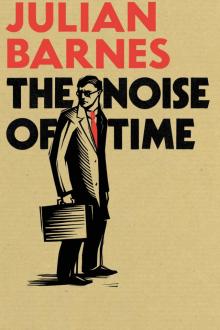 The Noise of Time
The Noise of Time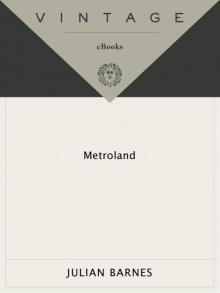 Metroland
Metroland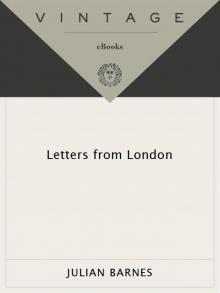 Letters From London
Letters From London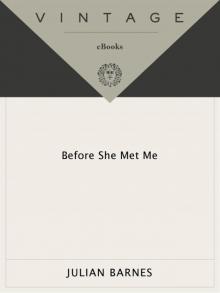 Before She Met Me
Before She Met Me Pulse
Pulse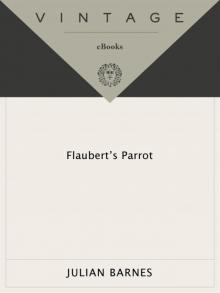 Flaubert's Parrot
Flaubert's Parrot England, England
England, England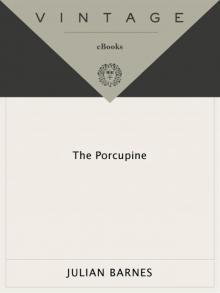 The Porcupine
The Porcupine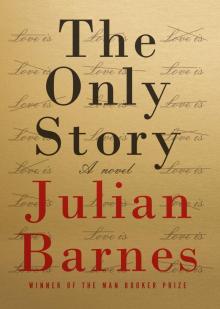 The Only Story
The Only Story Love, Etc
Love, Etc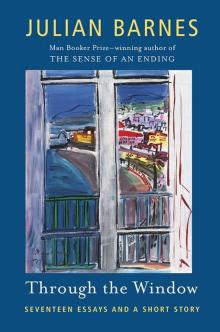 Through the Window: Seventeen Essays and a Short Story
Through the Window: Seventeen Essays and a Short Story Staring at the Sun
Staring at the Sun Cross Channel
Cross Channel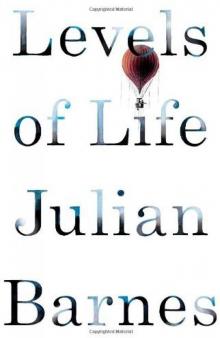 Levels of Life
Levels of Life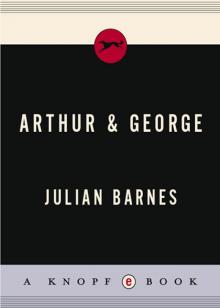 Arthur & George
Arthur & George Love, Etc.
Love, Etc. A History of the World in 10 1/2 Chapters
A History of the World in 10 1/2 Chapters Something to Declare
Something to Declare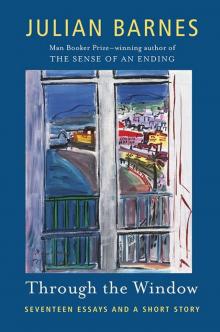 Through the Window: Seventeen Essays and a Short Story (Vintage International)
Through the Window: Seventeen Essays and a Short Story (Vintage International)